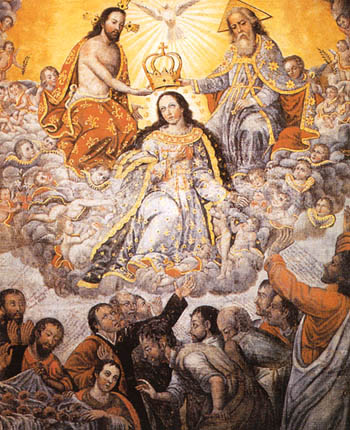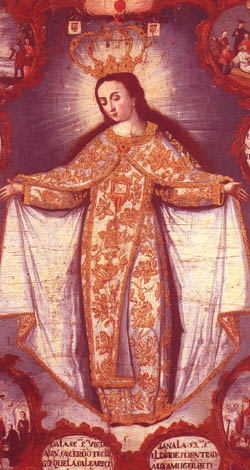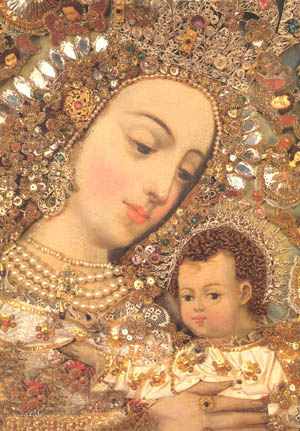Queenship of Our Lady
Prof. Plinio Corrêa de Oliveira
Prof. Plinio Corrêa de Oliveira
The queenship of Our Lady is supernatural in character because she is the first and highest of the creatures of God. She is not the first in the order of nature, for the Angels are more than she. An angel is a pure spirit and, therefore, more than a human creature. But she is the first creature in the order of grace. That is, she received incomparably more graces than the Angels. The graces the Angels received are subordinate to the graces Our Lady received.
She is also the first of all women. The first of all men is Our Lord Jesus Christ; the first of women is Our Lady. This alone would suffice to give her the right to queenship. For royalty is a de jure state from which flows a de facto situation. One who is first has the right to command and be served, and especially when her queenship is linked to an eternal queenship that will never end. This defines her queenship.
Our Lady is the first of creatures because she is the Mother of God. No one has had or can have a union with the Most Holy Trinity as close as hers. She is the Most Beloved Daughter of the Eternal Father, the Most Admirable Mother of the Eternal Word, and the Most Faithful Spouse of the Holy Ghost.
Our Lady is the first of creatures because she is the Mother of God. No one has had or can have a union with the Most Holy Trinity as close as hers. She is the Most Beloved Daughter of the Eternal Father, the Most Admirable Mother of the Eternal Word, and the Most Faithful Spouse of the Holy Ghost.

Further, she is Queen because God placed the government of all things in her hands. God does not do any supernatural thing on earth that does not pass through her. All the prayers that are raised from earth to Heaven pass through her; all the graces that come from God to earth are at her request. If all Heaven were to implore something without her intercession, it would not be attained; and if she alone among the citizens of Heaven would ask for something, she would obtain all she asked for. This makes her a Queen in the plenitude of the term.
Now then, these concepts that correspond to her Heavenly Queenship, which is her highest title, must correspond also to her earthly Queenship. What is this earthly Queenship of Our Lady? All of human society should be organized in such a way that everything is according to her will by the fact that she is Queen. All those who govern should follow her will. St. Louis of France used to call himself “le sergent de Dieu en France,” which freely translated means “God’s captain in France.”
Now then, these concepts that correspond to her Heavenly Queenship, which is her highest title, must correspond also to her earthly Queenship. What is this earthly Queenship of Our Lady? All of human society should be organized in such a way that everything is according to her will by the fact that she is Queen. All those who govern should follow her will. St. Louis of France used to call himself “le sergent de Dieu en France,” which freely translated means “God’s captain in France.”

How should one correspond to his or her vocation? It is to do everything that one can to preserve the deposit of Catholic doctrine as it was always taught by Holy Mother Church. Now then, since Vatican II this deposit of Faith, Morals, Liturgy and Canon Law has been systematically attacked by the enemies of the Church who infiltrated inside her and replaced her doctrine with quite different new teachings. So, obedience to one’s vocation implies the defense of this deposit from the enemies who attack it. Therefore, to be faithful to the call of Our Lady, we must fight to destroy her enemies in our days.
There is another point that still needs to be addressed. If to carry out the will of Our Lady is to follow the will of the Church, one could affirm that the Middle Ages was already the Reign of Mary. Why do we expect a future Reign of Mary?
There is another point that still needs to be addressed. If to carry out the will of Our Lady is to follow the will of the Church, one could affirm that the Middle Ages was already the Reign of Mary. Why do we expect a future Reign of Mary?

I think that if the Middle Ages had not deteriorated, it would have become the Reign of Mary. We can see that devotion to Our Lady was growing at the height of the Middle Ages. Then, it started to decline. A plan of God was interrupted.
Many of the truths about Our Lady had not yet been elucidated; many of the great Doctors of Our Lady had not taken Mariology to the higher levels it later attained. For instance, the great voice of St. Louis Grignion de Monfort had not yet been heard; slavery to Our Lady – defined by him as true devotion to Mary – had not been explained. Above all, the truth of the universal mediation of Our Lady had not been taught. These truths would have been discovered and taught to all Catholics if the Middle Ages had not fallen.
But this is not what happened. The Middle Ages fell. So, these truths came to light in a different way, without being properly reflected in the social sphere. They were not applied to all of society as they should have been. For the fullest glory of God on earth, it is necessary that His plan be fully executed here. That is, it is necessary for the royalty of Our Lady to be established on earth based upon these truths and still others that will come.
These are the principles that explain the full meaning of the Queenship of Our Lady, whose feast is today.
Many of the truths about Our Lady had not yet been elucidated; many of the great Doctors of Our Lady had not taken Mariology to the higher levels it later attained. For instance, the great voice of St. Louis Grignion de Monfort had not yet been heard; slavery to Our Lady – defined by him as true devotion to Mary – had not been explained. Above all, the truth of the universal mediation of Our Lady had not been taught. These truths would have been discovered and taught to all Catholics if the Middle Ages had not fallen.
But this is not what happened. The Middle Ages fell. So, these truths came to light in a different way, without being properly reflected in the social sphere. They were not applied to all of society as they should have been. For the fullest glory of God on earth, it is necessary that His plan be fully executed here. That is, it is necessary for the royalty of Our Lady to be established on earth based upon these truths and still others that will come.
These are the principles that explain the full meaning of the Queenship of Our Lady, whose feast is today.
http://www.traditioninaction.org/SOD/j129sdQueenship_4-31.htm
Mary's Queenship by Fr. William G. Most The beginning of the concept that Mary is a Queen is found in the annunciation narrative. For the angel tells her that her Son will be King over the house of Jacob forever. So she, His Mother, would be a Queen. The Fathers of the Church soon picked up these implications. A text probably coming from Origen (died c. 254: cf. Marian Studies 4, 1953, 87) gives her the title domina, the feminine form of Latin dominus, Lord. That same title also appears in many other early writers, e.g. , St. Ephrem, St. Jerome, St. Peter Chrysologus (cf. Marian Studies 4. 87-91). The word "Queen" appears abut the sixth century, and is common thereafter (Marian Studies, 4, 91-94). The titles "king" and "queen" are often used loosely, for those beings that excel in some way. Thus we call the lion the king of beasts, the rose the queen of flowers. Surely Our Lady deserves the title richly for such reasons. But there is much more. Some inadequate reasons have been suggested: She is the daughter of David. But not every child of a king becomes a king or queen. Others have pointed out that she was free from original sin. Then, since Adam and Eve had a dominion over all things (Genesis 1. 26) she should have similar dominion. But the problem is that the royalty of Adam and Eve was largely metaphorical. The solidly theological reasons for her title of Queen are expressed splendidly by Pius XII, in his Radiomessage to Fatima, Bendito seja (AAS 38. 266): "He, the Son of God, reflects on His heavenly Mother the glory, the majesty and the dominion of His kingship, for, having been associated to the King of Martyrs in the unspeakable work of human Redemption as Mother and cooperator, she remains forever associated to Him, with a practically unlimited power, in the distribution of the graces which flow from the Redemption. Jesus is King throughout all eternity by nature and by right of conquest: through Him, with Him, and subordinate to Him, Mary is Queen by grace, by divine relationship, by right of conquest, and by singular choice [of the Father]. And her kingdom is as vast as that of her Son and God, since nothing is excluded from her dominion." We notice that there are two titles for the kingship of Christ: divine nature, and "right of conquest", i.e., the Redemption. She is Queen "through Him, with Him, and subordinate to Him." The qualifications are obvious, and need no explanation. Her Queenship is basically a sharing in the royalty of her Son. We do not think of two powers, one infinite, the other finite. No, she and her Son are inseparable, and operate as a unit. Of the four titles Pius XII gave for her Queenship, we notice that two are closely parallel to those of Jesus: (1) He is king by nature, as God; she is Queen by "divine relationship" that is, by being the Mother of God. In fact her relation to her Son is greater than that of ordinary Mothers of Kings. For she is the Mother of Him who is King by very nature, from all eternity, and the relationship is exclusive, for He had no human father. Still further, the ordinary queen-mother gives birth to a child who later will become king. The son of Mary is, as we said, eternally king, by His very nature. (2) He is king by right of conquest. She too is Queen by right of conquest. We already saw that this title for Him means that He redeemed us from the captivity of satan. She shared in the struggle and victory. Since the Pope expressed her dependence on Him in a threefold way--something we would have known anyway--then it is clear that he did not have in mind any other restriction which he did not express. So, maintaining this subordination, "by right of conquest" means the same for her as it does for Him. The other two titles: (3) She is Queen by grace. She is full of grace, the highest in the category of grace besides her Son. (4) She is Queen by singular choice of the Father. A mere human can become King or Queen by choice of the people. How much greater a title is the choice of the Father Himself! Pius XII added that "nothing is excluded from her dominion." As Mediatrix of all graces, who shared in earning all graces, she is, as Benedict XV said, "Suppliant omnipotence": she, united with her Son, can obtain by her intercession anything that the all-powerful God can do by His own inherent power. In the Old Testament, under some Davidic kings, the gebirah, the "Great Lady", usually the Mother of the King, held great power as advocate with the king. Cf. 1 Kings 2:20, where Solomon said to his Mother Bathsheba, seated on a throne at his right: "Make your request, Mother, for I will not refuse you." Here is a sort of type of Our Lady. Excerpted and adapted from Theology 523: Our Lady in Doctrine and Devotion, by Father William G. Most. Copyright (c) 1994 William G. Most Electronic text (c) Copyright EWTN 1996. All rights reserved. |
No comments:
Post a Comment